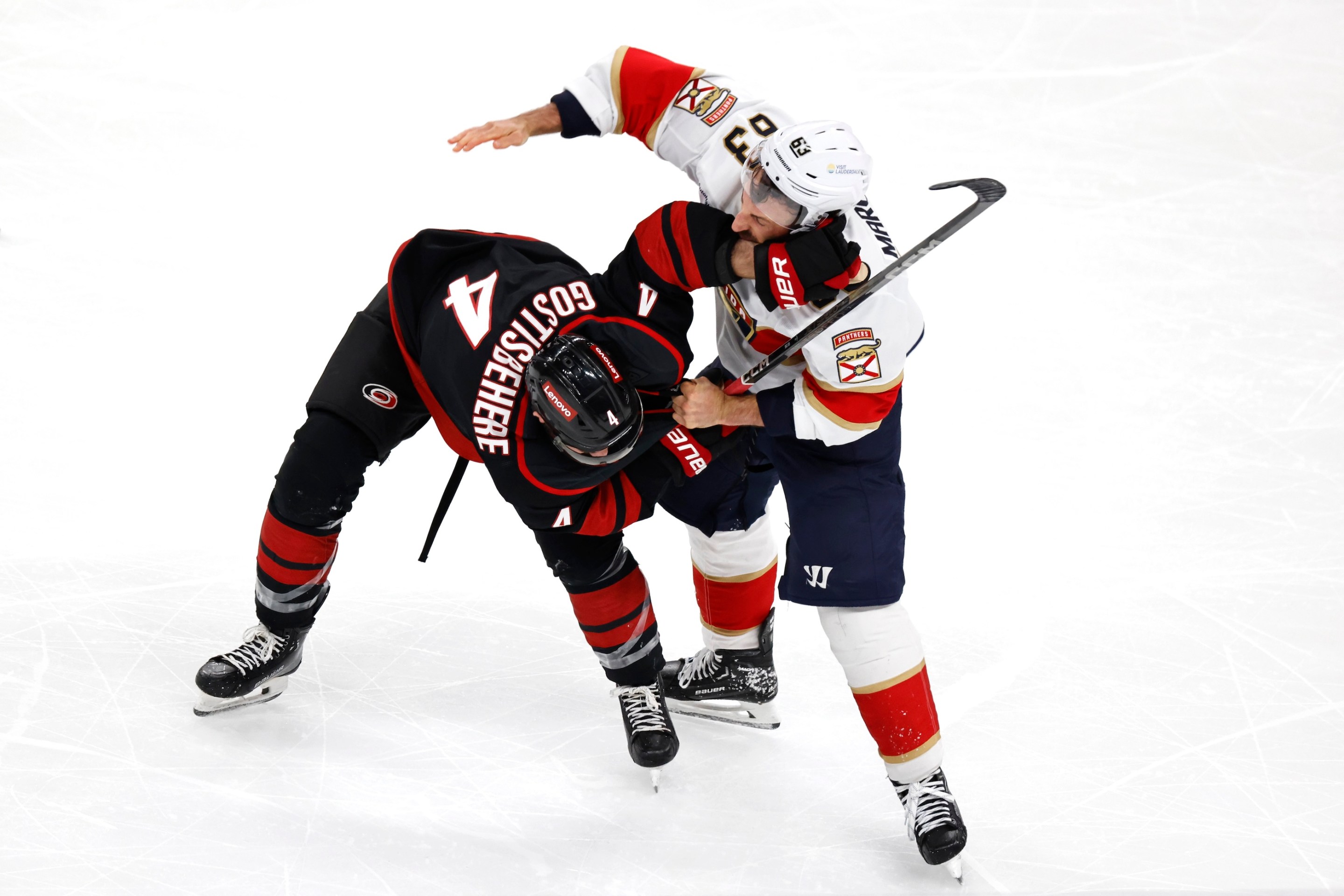The rule is simple and straightforward, and it rarely proves anything but true: Judgments made after Game 1 of any series will tend to return to embarrass the impulsive jurist who made them. Still, both in Oklahoma City and Raleigh last night, we learned one distinct commonality between the Thunder and Florida Panthers. While playing entirely different sports in different locations, they maintain the same general philosophical approach, which is to make your experience as an opponent so unpleasant that their experience as a combatant comes to be defined by yours as the supplicant.
In other words, they win by making you miserable. If they happen to elevate the art of their respective games along the way, well, that would be a happy but entirely unintended consequence of the main task. Their joy is in your frustration. Their satisfaction is derived from your impotence. The worse it gets, the better.
In both Game 1 of the NBA's Western Conference Finals and Game 1 of the NHL's Eastern Conference Final, that carefully inflicted misery was the principal theme. The Thunder made Minnesota's ability to run its offense the principal focus of their evening, contesting shots with noticeable zeal starting at 25 feet; they did this reliably and relentlessly enough that, when the Timberwolves fell behind, they had to take more (contested) threes to make up the difference. Those shots didn’t go down either, closing a circle of doom that ended with a 26-point loss that felt like it should have been worse. The only thing the Timberwolves could find solace in was seeing that Anthony Edwards's rolled ankle in the first half did not destroy his series before it began.
Nearly simultaneously, the Florida Panthers continued the defense of their Stanley Cup triumph by throttling the Carolina Hurricanes, 5-2, mostly by playing the same expense-laden "heavy" game that helped them wilt the Toronto Maple Leafs the series before. Like the Thunder, that lopsided final looks far closer than the actual difference between the teams. After a 10-minute feeling-out process—this part of the game is known to savants as "the stuff after the anthem and before the shit starts getting real"—the Panthers leaned into the Canes with vigor and repetition, making the seemingly simple task of getting a possession into the offensive end a repetitive and noxious chore. Carolina, whose last game was five days ago, managed more shot attempts by game's end, 78-46, but many of those were hurried out of frustration that there might never be another, to the point of being frantic and from easy-to-detect sightlines; Florida goaltender Sergei Bobrovsky's night was busy, but largely worry-free. Even Carolina's brief forays into hockey's dark arts (bumping Bob when possible, the odd-post-whistle scrum) were quickly smothered. Indeed, Florida coach Paul Maurice went to the extreme of saying he didn't like Florida's game, which is an odd bit of psychoanalysis after a three-goal win that could and perhaps should have been five.
There were small differences, to be sure. Florida's control of the game was established within the first 10 minutes, while Oklahoma City needed an entire half to shake off the effects of the quick turnaround from Saturday's seventh game against Denver (Minnesota also came into the series with a six-day rest). It is a fairly predictable fact that in the NBA playoffs, teams that play fewer games early tend to be sharper later; in the Stanley Cup playoffs, the number of games you play is less relevant the number of games in which your goalie doesn't suck, and Florida's star turn—this is the Panthers' third consecutive conference final—has coincided with Bob's excellence in springtime. They take a lead and simply do not return it; their games, when played right, are angst-free in that you can figure out fairly quickly who is who and what's going to be what.
There is another, albeit minor, point of comparison between the Thunder and Panthers, and that is the lingering and still forceful impression that each team has a magic irritant that changes games to their benefit. For Florida, that is Brad Marchand, whose best days are clearly in the rearview mirror but who has also invigorated the Panthers third line with Anton Lundell and Eetu Luostarinen into being the best threesome in the playoffs. Marchand's snipfest against Carolina's Shayne Gostisbehere midway through the third period was a scene-setter for the annoying chippiness to come.
Marchand, though, is in no way the Panthers' best player; that would be Aleksander Barkov. Oklahoma City's best player and foremost irritant is Shai Gilgeous-Alexander, who is getting a reputation as a foul hunter to rival that of former Thunderer James Harden. That rep is hardly universal; Harden was universally condemned for foul-grifting being the principal feature of his game whether you had a rooting interest or not, while Gilgeous-Alexander utilizes the tactical flail as one tool in a broader belt of skills that will likely make him one of the faces of the league’s post-LeBron/Curry era. He missed 17 of his 27 shots in Game 1, but was still the hinge that opened all the necessary doors for OKC in the second half rout. If you take out the deeply anomalous first half of Game 3 of the Memphis series, the Thunder's margin of victory this postseason has been 51, 19, 32, 2, 26, 43, 5, 7 and 26. That's an average of 23.4 per game, and they allow a very 1990s 102 points per game for the opponent.
These two games indicate that these two series will largely be about who hates it less, thus putting much greater pressure on Pacers-Knicks and Oilers-Stars to be freewheeling and angst-free joyrides. Those four teams play comfortably, with open throttles and high shot totals; that’s the fun side of the ledger, and Tuesday night’s was the heavier half. Those two series, whatever your personal distaste for detestable metropoles like New York or Dallas, give off the distinct vibe of depending upon how the winner creates joy rather than stifles it. But lest you need reminding, the only thing objectively stupider than predicting a series based on one game is predicting it based on none.






